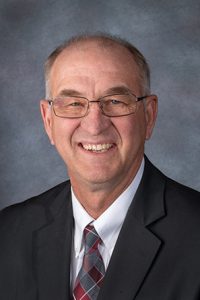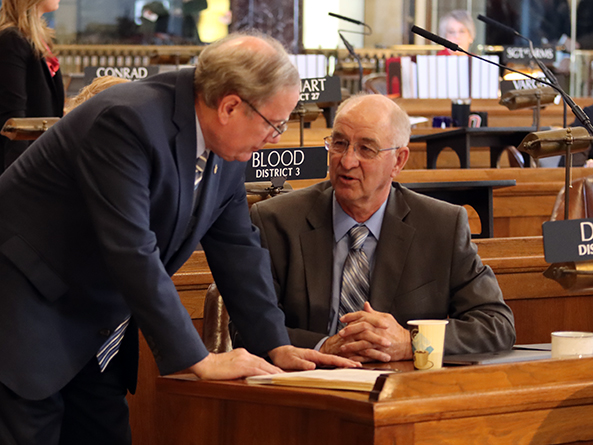E-15 requirement for retailers advances
Lawmakers gave first-round approval April 25 to a bill intended to increase consumer access to E-15 in Nebraska.

As introduced by Sen. Myron Dorn of Adams, LB562 would, with some exceptions, require motor fuel retail dealers in Nebraska to advertise and sell E-15 — which the bill defines as gasoline with more than 10 percent but no more than 15 percent by volume of ethanol — from at least 50 percent of their qualifying dispensers, beginning in 2024.
Although Nebraska is the second largest ethanol producer in the country, Dorn said, it ranks nearly last in consumption.
“This bill creates an opportunity for Nebraskans to not only save money at the pump and have cleaner air but also to support an entire value chain,” he said.
A pending Agriculture Committee amendment would replace the bill with a modified version of the original proposal. Under the amendment, the 50 percent requirement would apply if a retail dealer builds a new retail motor fuel site or replaces more than 80 percent of the motor fuel storage and dispensing infrastructure at an existing site.
A site that has only one dispenser or sells an average of 300,000 gallons of gasoline per year or less would be exempt from the requirement if it files a statement with the state Department of Agriculture.
Beginning in 2028, if the statewide ethanol blend rate — the average percentage of ethanol contained in each gallon of motor fuel sold — for 2027 is below 14 percent, each retail dealer would be required to advertise and sell E-15 from at least one qualifying dispenser at each site unless the site:
• has been issued a waiver because its infrastructure is not compatible with E-15 and the cost to replace it would exceed $15,000;
• has motor fuel storage tanks made of certain materials or installed before certain dates; or
• qualifies as a small retail motor fuel site.
Dorn said increasing Nebraska’s ethanol blend rate from the current 9.6 percent to 14 percent would save consumers approximately $50 million on fuel costs each year and benefit Nebraska corn growers and ethanol plants.
Lawmakers last year passed a measure creating a refundable state income tax credit for retail dealers that sell and dispense E-15 or higher blends.
The committee amendment would increase the credit from 5 cents to 8 cents for each gallon of E-15 sold during 2024. The credit would be 9 cents per gallon in 2025, 8 cents per gallon in 2026, 7 cents per gallon in 2027 and 5 cents per gallon in 2028. It also would increase the annual limit on credits from $4 million to $5 million for those years.
Sen. Jana Hughes of Seward said the amendment is a compromise between Nebraska’s ethanol industry and motor fuel retailers and that she would not vote to advance LB562 to select file unless it was adopted.
Hughes said increasing the credit is intended to encourage more retail dealers to offer E-15, which would increase Nebraska’s ethanol blend rate to a level that would make the requirement that gas stations sell E-15 from at least one dispenser unnecessary.
Hastings Sen. Steve Halloran supported the bill, saying most gas stations could convert their existing E-10 storage tanks and dispensing infrastructure for E-15 at “minimal cost.”
Sen. Jane Raybould of Lincoln said the switch could be a financial burden for smaller retailers and that consumer choice should determine which products a business offers, not a government mandate.
Omaha Sen. Megan Hunt opposed LB562 and filed several procedural motions to delay a vote, preventing consideration of the committee amendment on the first round of debate. She said the proposal is a “handout” to the state’s ethanol industry and agricultural landowners.
“The ethanol industry has been around for a long enough time now that it should be able to stand up on its own without government mandates,” Hunt said.
Additional subsidies for corn and ethanol production would lead to greater consumption of water, electricity and fertilizer as well as increased soil runoff and carbon dioxide emissions, she added.
After eight hours of debate on general file, Dorn filed a motion to invoke cloture, which ends debate and forces a vote on the bill and any pending amendments.
The motion succeeded on a vote of 37-0. Thirty-three votes were needed.
Lawmakers then advanced LB562 to select file on a vote of 32-1.


